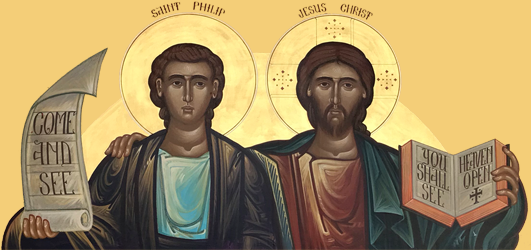Genesis 22:2
“Then He said, ‘Take now your beloved son, Isaac, whom you love, and go to the land of Moriah, and offer him there as a whole burnt offering on one of the mountains I tell you.’” (OSB)
The “Sacrifice of Isaac” is certainly one of the most profound narratives in Scripture, both illuminating and being illumined by the Passion of Christ, of which it is a prefigurative icon. Indeed, the account is filled with references to “seeing”— “God will see for himself a lamb” (22:8), “Abraham lifted up his eyes and looked” (22:13), “In the mountain the Lord was seen” (22:14). No wonder Christ says, “Your father Abraham rejoiced to see My day, and he saw it and was glad” (Jn 8:56).
As St. John Chrysostom discusses (Hom. Gen. 47.4-5), this narrative must be read in the context of God’s promise and covenant with Abraham. In Genesis 15, God in effect swears by Himself that He will be faithful to His covenant promises with Abraham (outlined in Genesis 12), and of course God cannot lie. So while it is conceivable that Abraham might endanger the promise God has made (e.g., in his failings with Hagar & Ishmael [Gen 16], with “Sarah is my sister” lies [Gen 20]), it is shocking and mysterious that God would make a request of Abraham—even as a “test”— that would end up nullifying the very promise He Himself has made—“in Isaac your seed shall be called” (Gen 21:12; Rom 9:7). If Isaac dies, how will God prove faithful to His promises?
The answer: by means of the “ram” who is the Lamb of God “foreordained before the foundation of the world” (1 Pet 1:19-20; Jn 1:29). What the Christian cannot help but see here is God’s providence at work revealing to Abraham, Isaac, and their descendants the spiritual reality in which they are participating and to which their lives are pointing—namely, that the Seed of Abraham is Christ Himself (Gal 3:16), and thus to be an heir of God’s promise to Abraham, even for Isaac, means identification with the slain Lamb of God, Christ, not with a particular people-group or forebearer.
So God seemingly jeopardizes His own promises to Abraham to teach us, first, that the true Abrahamic people of God are defined by faith in and faithfulness to God. Abraham acting as priest and Isaac acting as both offering and priest show in outline the restored priesthood of humanity—God does not want their “sacrifices,” He wants them as living sacrifices (Rom 12:1-2). The life of total self-offering and communion with God is the only real sacrifice in which God delights—and such is the offering that Christ makes to God the Father once and for all. It is Christ’s sacrifice into which we continually enter and by which we offer ourselves to God in the Eucharist and in a life of repentance and love for God and others expressed in good works.
Secondly, God teaches us that “it is the Spirit that gives life; the flesh profits nothing” (Jn 6:63)—“for we are the circumcision, who worship God in the Spirit, [who] rejoice in Christ Jesus, and have no confidence in the flesh” (Phil 3:3). It is by God’s grace alone—which is the gift of His own life to us—that we are accounted worthy of participation in Abraham’s spiritual family. And thus our “boast” must ever and only be in Christ crucified, the Seed of Abraham, for in truth “God is able to raise up children to Abraham from these stones” (Matt 3:9).
The Sacrifice of Isaac acquires even more depth when we realize that Mt. Moriah (Gen 22:2) is equated with Jerusalem in 2 Chronicles 3:1: where Isaac is offered is the same place that Israel will offer all of its sacrifices, and where Christ Himself will be sacrificed! Jerusalem is also connected with “Salem” where Melchizedek served as king-priest to the Most High God (Gen 14:18) according to an eternal priesthood (Ps 109/110:4). We see, then, that the sacrifice of Isaac is a “founding event” for Israel’s whole system of worship and sacrifice, linking the Old Covenant system to both the “eternal past” and “eternal future” of Christ’s high-priestly ministry and self-offering “outside the city” of Jerusalem. We worship Thy Passion, O Christ! Make us to behold Thy glorious Resurrection!
~ By Reader Justin Gohl

